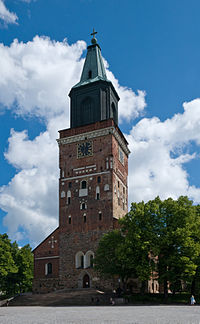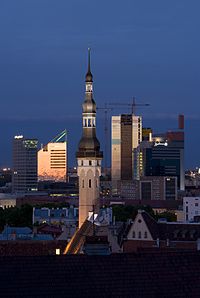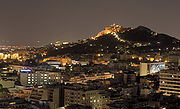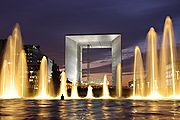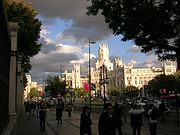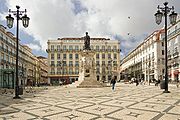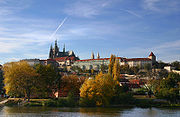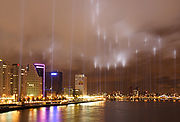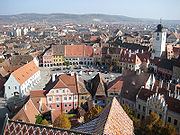- European Capital of Culture
-
The European Capital of Culture is a city designated by the European Union for a period of one calendar year during which it organises a series of cultural events with a strong European dimension.
Preparing a European Capital of Culture can be an opportunity for the city to generate considerable cultural, social and economic benefits and it can help foster urban regeneration, change the city's image and raise its visibility and profile on an international scale.
In 1985, former actress Melina Mercouri, then Greece’s Minister of Culture, and her French counterpart Jack Lang came up with the idea of designating an annual Capital of Culture to bring Europeans closer together by highlighting the richness and diversity of European cultures and raising awareness of their common history and values.
The Commission of the European Union manages the title and each year the Council of Ministers of the European Union formally designates European Capitals of Culture: more than 40 cities have been designated so far.
An international panel of cultural experts is in charge of assessing the proposals of cities for the title according to criteria specified by the European Union.
A 2004 study conducted by Robert Palmer for the European Commission, demonstrated that the choice of European Capital of Culture served as a catalyst for the cultural development and the transformation of the city.[1] Consequently, the beneficial socio-economic development and impact for the chosen city are now also considered in determining the chosen cities.
Contents
History
The European Capital of Culture programme was initially called the European City of Culture and was conceived in 1983 by Melina Mercouri, then serving as Greek Minister of Culture. Mercouri believed that at the time, culture was not given the same attention as politics and economics and a project for promoting European cultures within the member states should be pursued. The European City of Culture programme was launched in the summer of 1985 with Athens being the first title-holder. During the German Presidency of 1999, the European City of Culture programme was renamed the European Capital of Culture.
List of European Cities/Capitals of Culture
EU Capitals of Culture  Athens (1985)
Athens (1985)  Berlin (1988)
Berlin (1988)  Paris (1989)
Paris (1989)  Madrid (1992)
Madrid (1992)  Lisbon (1994)
Lisbon (1994)  Stockholm (1998)
Stockholm (1998)  Prague (2000)
Prague (2000)  Rotterdam (2001)
Rotterdam (2001)  Sibiu (2007)
Sibiu (2007)  Istanbul (2010)
Istanbul (2010) - 1985:
 Athens
Athens - 1986:
 Florence
Florence - 1987:
 Amsterdam
Amsterdam - 1988:
 Berlin
Berlin - 1989:
 Paris
Paris - 1990:
 Glasgow
Glasgow - 1991:
 Dublin
Dublin - 1992:
 Madrid
Madrid - 1993:
 Antwerp
Antwerp - 1994:
 Lisbon
Lisbon - 1995:
 Luxembourg
Luxembourg - 1996:
 Copenhagen
Copenhagen - 1997:
 Thessaloniki
Thessaloniki - 1998:
 Stockholm
Stockholm - 1999:
 Weimar
Weimar - 2000:
 Avignon,
Avignon,  Bergen,
Bergen,  Bologna,
Bologna,  Brussels,
Brussels,  Helsinki,
Helsinki,  Kraków,
Kraków,  Prague,
Prague,  Reykjavík,
Reykjavík,  Santiago de Compostela
Santiago de Compostela - 2001:
 Rotterdam,
Rotterdam,  Porto
Porto - 2002:
 Bruges,
Bruges,  Salamanca
Salamanca - 2003:
 Graz
Graz - 2004:
 Genoa,
Genoa,  Lille
Lille - 2005:
 Cork
Cork - 2006:
 Patras
Patras - 2007:
 Sibiu,
Sibiu,  Luxembourg,
Luxembourg, 


 Greater Region
Greater Region - 2008:
 Liverpool,
Liverpool,  Stavanger
Stavanger - 2009:
 Vilnius
Vilnius  Linz
Linz - 2010:
 Essen (representing the Ruhr),
Essen (representing the Ruhr),  Istanbul,
Istanbul,  Pécs
Pécs - 2011:
 Turku,
Turku,  Tallinn
Tallinn
According to the official EU website.[2] The cities and countries from 2020–2029 are not yet finalised.
- 2012:
 Guimarães,
Guimarães,  Maribor
Maribor - 2013:
 Marseille,
Marseille,  Košice
Košice - 2014:
 Umeå,
Umeå,  Riga
Riga - 2015:
 Mons,
Mons,  Plzeň
Plzeň - 2016:
 Donostia-San Sebastián,
Donostia-San Sebastián,  Wrocław
Wrocław - 2017:
 Denmark,
Denmark,  Cyprus
Cyprus - 2018:
 Netherlands,
Netherlands,  Malta
Malta - 2019:
 Italy,
Italy,  Bulgaria
Bulgaria - 2020:
 Romania,
Romania,  Serbia,
Serbia,  Ireland
Ireland - 2021:
 Greece,
Greece,  Croatia,
Croatia,  Switzerland
Switzerland - 2022:
 United Kingdom,
United Kingdom,  Macedonia,
Macedonia,  Turkey
Turkey - 2023:
 Norway,
Norway,  Lithuania,
Lithuania,  Bosnia and Herzegovina
Bosnia and Herzegovina - 2024:
 Germany,
Germany,  Ukraine,
Ukraine,  Albania
Albania - 2025:
 Austria,
Austria,  Iceland,
Iceland,  Montenegro
Montenegro
Cities that have shown interest within their countries to bid for becoming European Capital of Culture:- 2017:
 Cyprus: Nicosia official website Nicosia, Pafos official website Pafos, Limassol
Cyprus: Nicosia official website Nicosia, Pafos official website Pafos, Limassol - 2019:
 Bulgaria: Sofia, Plovdiv, Varna, Burgas, Ruse
Bulgaria: Sofia, Plovdiv, Varna, Burgas, Ruse - 2020:
 Romania: Timişoara, Cluj-Napoca, Iași
Romania: Timişoara, Cluj-Napoca, Iași
See also
- American Capital of Culture – a similar initiative among the American countries
- Arab Capital of Culture – a similar initiative among Arab countries
- Europalia
References
- ^ Palmer, Robert. "Study on the European Cities and Capitals of Culture and the European Cultural Months (1995-2004)". European Commission. http://ec.europa.eu/culture/key-documents/doc926_en.htm. Retrieved 24 January 2010.
- ^ Official EU website
Sources
- García, B. (2005) “De-constructing the City of Culture: The long term cultural legacies of Glasgow 1990”, in: Review Issue of Urban Studies (vol. 42, No. 5/6, pp. 1–28).
- García, B. (2004) “Cultural Policy in European Cities: Lessons from Experience, Prospects for the Future”, in: Special edition on Cultural Policy and Regeneration, Local Economy (vol 19, No. 4, pp. 312–326).
- García, B. (2004) “Urban Regeneration, Arts Programming and Major events: Glasgow 1990, Sydney 2000 and Barcelona 2004”, in: Gibson, L. & Stevenson, D. (Eds) Special Issue of the International Journal of Cultural Policy: Urban Space and the Uses of Culture (vol 10, No. 1, pp. 103–118).
External links
- European Commission - European Capitals of Culture
- Documentation Centre on European Capitals of Culture
- Current cities
- Past cities
- Graz 2003
- Cork 2005
- Sibiu 2007
- Liverpool 2008
- Stavanger 2008
- Vilnius 2009
- Linz 2009
- Istanbul 2010
- Istanbul 2010 – European Capital of Culture (Unofficial Portal)
- Essen 2010
- Pécs 2010
- Future cities
- Guimarães 2012
- Maribor 2012
- Marseille Provence 2013
- Košice 2013
- Rīga 2014
- Umeå 2014
- Mons 2015
- Plzeň 2015
- Donostia-San Sebastián 2016
- Wrocław 2016
- Potential European Capitals of Culture
European Capitals of Culture 1985 Athens · 1986 Florence · 1987 Amsterdam · 1988 West Berlin · 1989 Paris · 1990 Glasgow · 1991 Dublin · 1992 Madrid · 1993 Antwerp · 1994 Lisbon · 1995 Luxembourg City · 1996 Copenhagen · 1997 Thessaloniki · London 1998 Stockholm · 1999 Weimar · 2000 Reykjavík · Bergen · Helsinki · Brussels · Prague · Kraków · Santiago de Compostela · Avignon · Bologna · 2001 Rotterdam · Porto · 2002 Bruges · Salamanca · 2003 Graz · 2004 Genoa · Lille · 2005 Cork · 2006 Patras · 2007 Luxembourg City and Greater Region · Sibiu · 2008 Liverpool · Stavanger · 2009 Linz · Vilnius · 2010 Essen · Istanbul · Pécs · 2011 Turku · Tallinn · 2012 Maribor · Guimarães · 2013 Košice · Marseille · 2014 Umeå · Riga · 2015 Mons · Plzeň · 2016 San Sebastián · Wrocław
Categories:- European Capitals of Culture
- Cultural policies of the European Union
- Lists of cities in Europe
- 1985:
Wikimedia Foundation. 2010.

